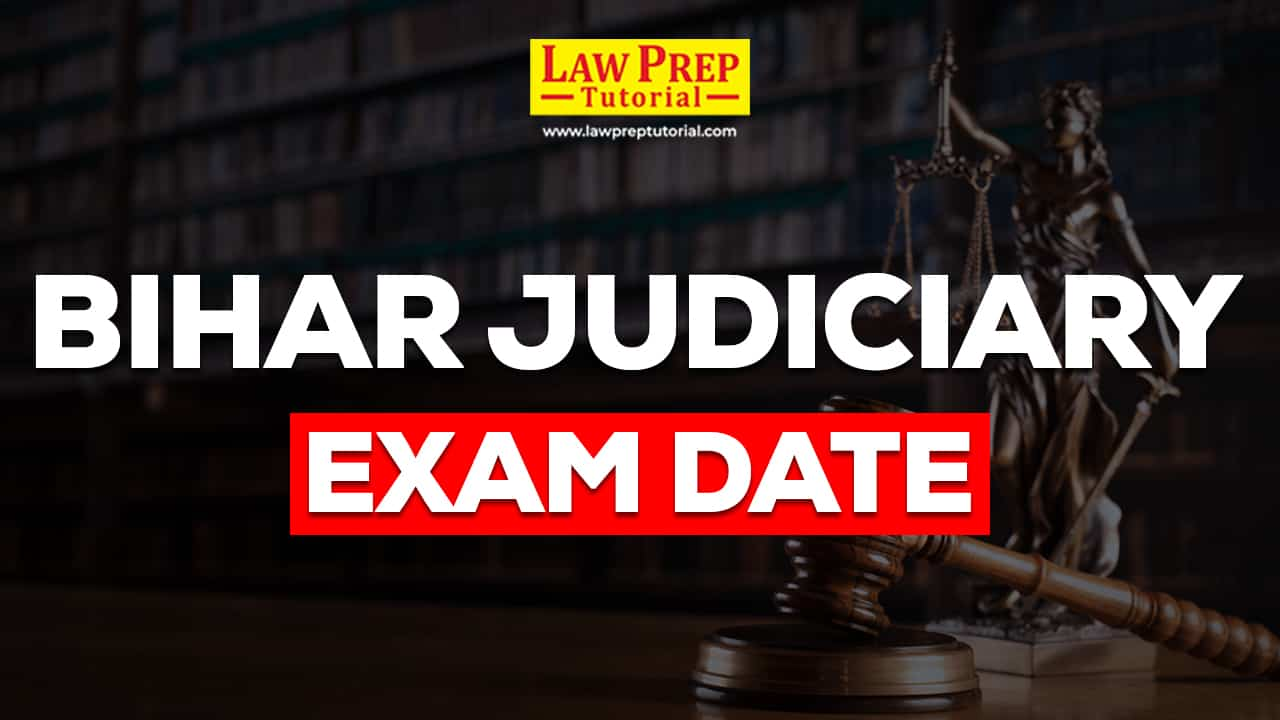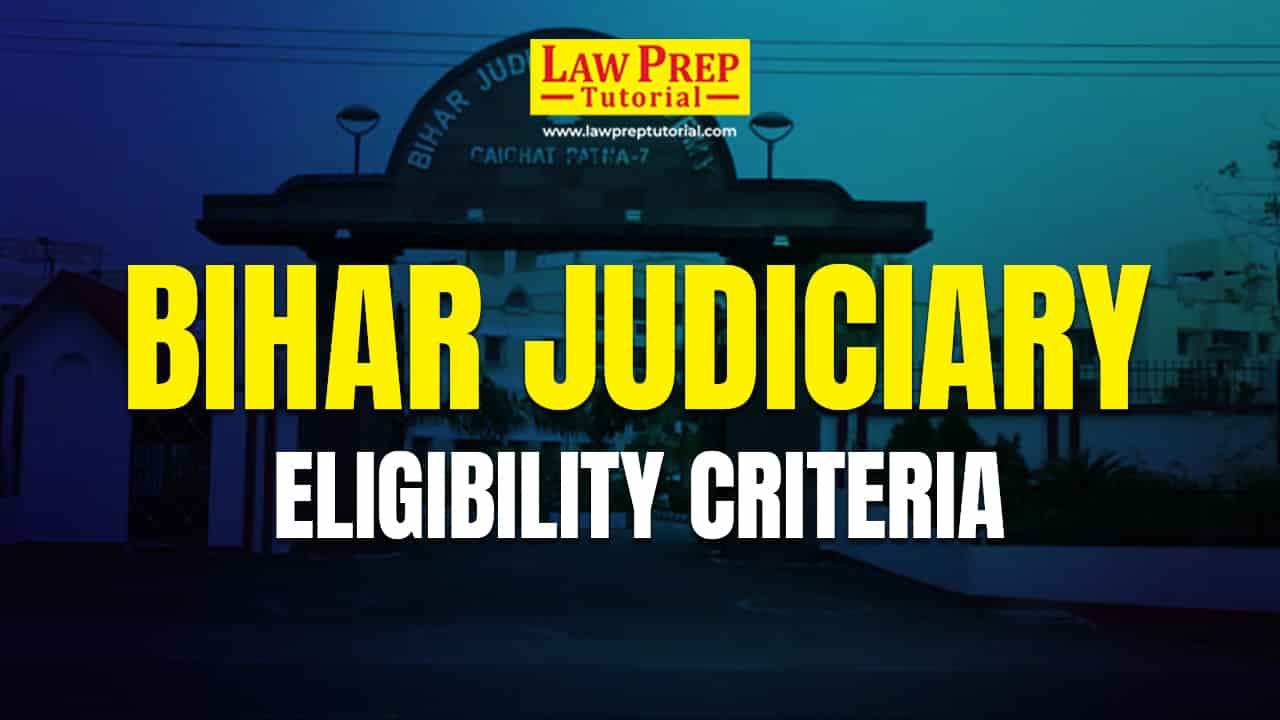BPSC (Bihar Public Service Commission) conducts the Bihar Judiciary examination, an important step in selecting Civil Judges for Bihar’s judicial services. It’s known for its rigorous evaluation process, including the Prelim Examination, the Mains Examination, and the Interview. Advancing to each stage depends on success in the previous one, making it a highly competitive journey for aspirants.
To be eligible for this exam, candidates must meet specific criteria. They must have a Bachelor of Laws (LLB) degree from a recognized university, showcasing their primary knowledge of legal principles. Further, candidates should be between 22 and 35 years old, balancing youthful energy and the maturity required for a judicial career.
The Bihar Judiciary syllabus 2025, a crucial examination part, covers various legal subjects. Aspirants must thoroughly understand these subjects since they form the foundation for their future roles as Civil Judges in Bihar.
Apart from legal topics, the Bihar Judiciary examination also evaluates candidates’ knowledge of Current events, General awareness, and proficiency in English. This ensures that future judges have a solid legal background, can comprehend and address contemporary societal issues, and effectively communicate their judgments.
A Brief About Bihar Judiciary Exam
The Bihar judiciary prelims exam is a 2-hour test with 100 multiple-choice questions. These questions cover General Knowledge, Current Affairs, and Law to see how much candidates know about these things.
After the prelims exam, there’s the Mains exam, which has 4 papers, each worth 100 marks. These papers test a candidate’s legal skills and knowledge in detail.
The Bihar Public Service Commission conducts this exam annually. Because this exam looks at current events and legal topics, it’s super important for candidates to understand the subjects. If you focus on the right areas and become an expert in these topics, you will have a better chance of doing well in the upcoming exam.
Bihar Judiciary Exam 2025: Highlights
According to BPSC, there are 3 stages in the exam:
- Preliminary Examination (Objective type)
- Mains Examination (Written exam)
- Personal Interview/ Viva Voce
However, the preliminaries and main exams have different syllabuses. Knowing the curriculum is the first step in your preparation. Remember that only those who pass the preliminary exam will be chosen to take the main exam. The final merit list is prepared by evaluating the Mains exam and Viva Voce scores.
| Particulars | Details |
| Name of the Organisation | Bihar High Court |
| Name of the Post | Civil Judge |
| Selection Process | Preliminary ExamMains Exam Personality Test |
| Location of the Job | Bihar |
| Mode of Application | Online |
| Mode of Exam | Offline |
| Official Website | bpsc.bih.nic.in |
Do checkout: How to Prepare for Bihar Judiciary Exam?
Bihar Judiciary Syllabus 2025
Candidates appearing in the Bihar Public Service Commission exam must check the latest syllabus of Bihar Judiciary exam. Also, they must check the exam pattern to know the Bihar Judicial question paper properly.
The BJS syllabus will help the aspirants analyze their preparation level for the BPSC examination. The BJS exam syllabus must be covered thoroughly before the exam so students can revise the tough topics.
1. Bihar Judiciary Syllabus: Prelims
According to the Bihar Judicial Services syllabus, 2 papers will be in the Bihar Judicial Services preliminary examination. Students must check the entire Bihar Judiciary syllabus for better understanding and preparation.
| Type of Exam | Type of Paper | Subject | Total Marks |
| Written Test | Paper I | General Studies | 100 |
| Paper II | Law | 150 | |
| Total Prelims Paper Marks | 250 | ||
Check the table below for the Bihar Judicial Services prelims syllabus for Papers I and II.
| Subject | Topics Covered |
| General Knowledge | Current important events of National and InternationalIndian History and the Indian National MovementIndian and World GeographyIndian Polity and EconomyThe questions are based on the level which the candidates can answer without particular study |
| Elementary General Science | The questions are based on everyday observation and experience in their scientific aspects. |
| Law | Law of Transfer of PropertyPrinciples of EquityLaw of TrustsSpecific Relief ActLaw of ContractsLaw of TortsElementary General ScienceLaw of Evidence and ProcedureConstitutional and Administrative Law of IndiaHindu law & Mohammedan LawCommercial Law |
2. Bihar Judiciary Syllabus: Mains
The Mains exam is the second stage of the selection process, after the preliminary exam. Only those test takers who qualify for the prelims exam can appear for the Main exam.
| Type of Examination | Subject | Total Marks |
| Compulsory | General Knowledge & Current Affairs | 150 |
| Elementary General Science | 100 | |
| General English | 100 | |
| General Hindi | 100 | |
| Law Evidence & Procedure | 150 | |
| Optional | Constitution Law of India | 150 |
| Hindu Law & Mohammedan Law | 150 | |
| Transfer of Property, Principal of Equity, Law of Trust & Specific Relief Act | 150 | |
| Law of Contract & Torts | 150 | |
| Commercial Law | 150 |
Go through the Bihar Judiciary syllabus in detail for compulsory and optional subjects from below table and plan your preparation accordingly.
| Subjects | Topics Covered |
| General Knowledge / General Studies | Current important events of national and international Indian History and the Indian National MovementIndian and World GeographyIndian Polity and EconomyThe questions will be based on the level that the candidates can answer without special study. |
| Elementary General Science | Questions test matters of everyday observation and experience in their scientific aspects. |
| Law of Evidence & Procedure | Indian Evidence Act (1 of 1872)Civil Procedure Code (5 of 1908)Arbitration and Conciliation Act 1996Code of Criminal Procedure, 1973 (2 of 1974)Provincial Small Cause Courts Act, 1887 |
| Commercial Law | The main principles of law relating to: Sale of Goods,Negotiable Instruments,Company LawPartnership. |
| Hindu Law and Mohammedan Law | Hindu Law, including Schools, Marriage, Adoption, Impartible Estate, EndowmentMuhammadan Law, including Marriage Law, Adoption, Wills, Legitimacy, Acknowledgement, Guardianship |
| Constitutional and Administrative Law of India | Constitution of India – Articles 1 to 395 and Schedules Administrative Law of India: Delegated LegislationControl of Delegated Legislation – Judicial & LegislativeFair Hearing; Rules of Natural Justice; Rules Against Bias; Audi Alteram PartemTribunals and Quasi-Judicial Authorities; Judicial Control over themRegulatory- AuthoritiesJudicial Review of Administrative ActionWrit Jurisdiction and Statutory Judicial Remedies, Scope, Extent & DistinctionPublic Interest LitigationTortious Liability of State and CompensationPromissory Estoppel, Legitimate Expectation & Doctrine of ProportionalityGovernment ContractsOmbudsman |
| English Language | Word analogiesSpotting Errors in sentences and phrasesAntonyms and SynonymsFill in the blanks with missing wordsUsage of prepositions, idioms, and phrasesTest of spellingsRearranging sentencesQuestions to test comprehension – with passage to be read and questions based on the same.Questions will test the understanding of and the power to write English. A passage or passages will usually be set for summary or precis.Questions will include letter writing on a given subject. |
| General Hindi | Reading ComprehensionEssayGrammarPrecise Writing |
Must Check: Bihar Judiciary Exam Date
3. Bihar Judiciary Syllabus: Interview Round
The interview phase, being the third and final stage of the Bihar PCS J examination, involves a wide range of legal and personal inquiries. To excel in the Bihar PCS J syllabus for the interview, it is highly advisable to possess an extensive grasp of all aspects of the law and a deep understanding of your personal history, professional experiences, and the latest legal developments. The in-person interview in the Bihar Judiciary exam carries a weightage of 100 marks.
A candidate’s selection hinges on performance in the Main exam and the interview. To be considered for inclusion in the final merit list, candidates must attain a minimum score of 35% in the interview phase.
Tips to Prepare for Bihar Judiciary Exam
To succeed, you need a good preparation strategy to crack the exam. Here are some tips to prepare for the BPSC Judiciary exam syllabus:
1. Understand the Exam Pattern
The first step is understanding the Bihar Judiciary exam pattern, including the questions, marking scheme, and exam duration. This will help you to plan your preparation accordingly.
2. Know the Syllabus
To avoid missing out on important topics, thoroughly knowing the Bihar Judiciary syllabus is essential. Read the syllabus carefully and note all the topics that need to be covered.
3. Plan your Preparation
Based on the BJS syllabus, make a study plan that includes all the topics and sub-topics. Allocate sufficient time for every topic and prioritize them based on importance and weightage.
4. Study Material
Collect all the relevant study material, including books, notes, and online resources. Ensure that the material is from reliable sources and covers the entire syllabus.
Read more about: Bihar Judiciary Eligibility Criteria
Best Books to Cover Bihar Judiciary Exam Syllabus
To qualify for the BPSC Judiciary exam, following the standard books prescribed by the toppers, helps prepare the topics relevant to the exam. These books contain lucid explanations for the chapters asked in the BPSC Judiciary examination.
| Book Name | Author Name |
| The Law of Evidence | Batuk Lal |
| Civil Procedure with Limitation Act 1963 with New Chapter on Commercial Courts – Authoritarian Text Book on Civil Procedure Code – Latest Edition | C K Takwani |
| The Indian Contract Act Bare Act | Mulla |
| Modern Hindu Law | Paras Diwan and Peeyushi Diwan |
| Contract – I (Law of Contract – I with Specific Relief Act) Paperback – 1 January 2018 | Dr. R K Bangia |
| Encyclopedia of Samanya Vigyan (Hindi) | Arihant Publications |
| Objective General English | S P Bakshi |
| Lucent’s General Knowledge | Dr. Binay Karna, R.P. Suman, Manvendra Mukul, Renu Sinha, and Sanjeev Kumar |
Conclusion
Cracking the Bihar Judiciary Exam requires a comprehensive understanding of the Bihar PCS J syllabus, a systematic study plan, and consistent preparation. By dedicating yourself to focused and disciplined study, you can increase your chances of success in the Bihar Civil Judge exam. Stay motivated, work hard, and believe in your abilities.




